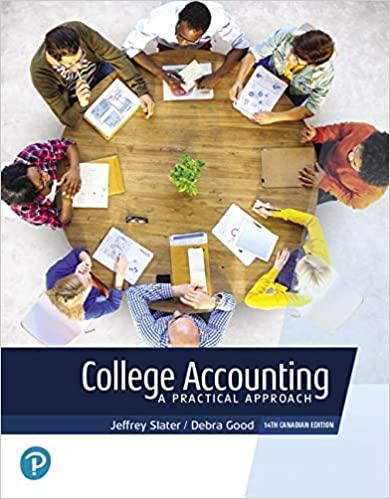Answered step by step
Verified Expert Solution
Question
1 Approved Answer
please answer the following questions based on the problems bellow. PR 11-1A Bond discount, entries for bonds payable transactions Obj. 2 On July 1, Year
please answer the following questions based on the problems bellow. 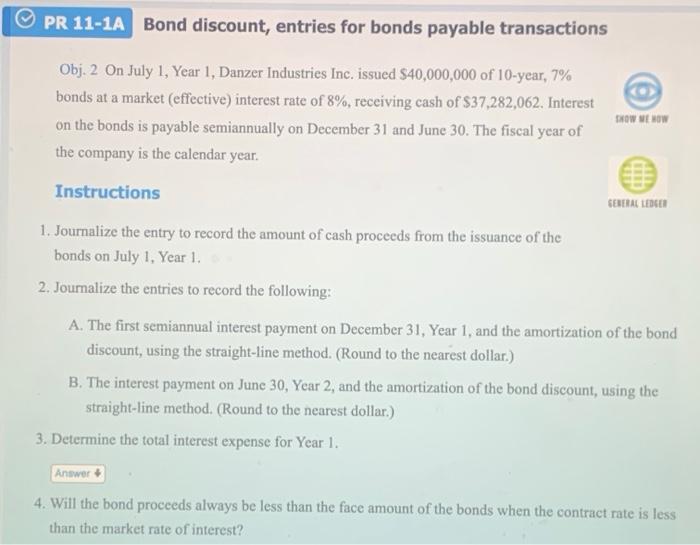
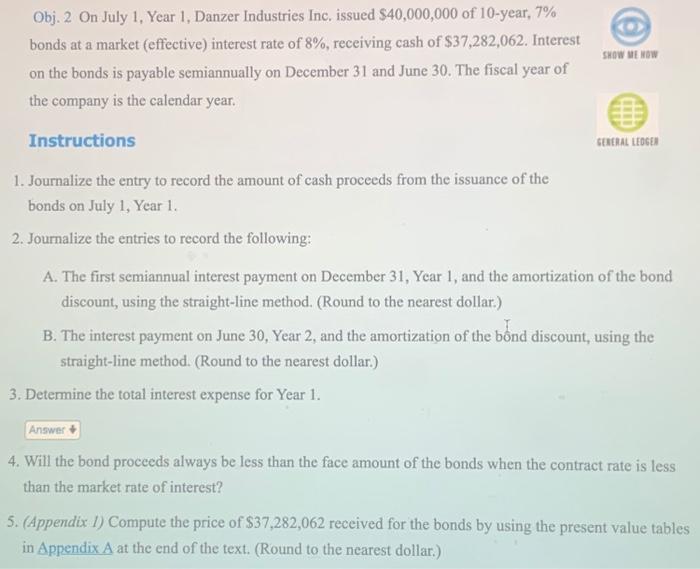
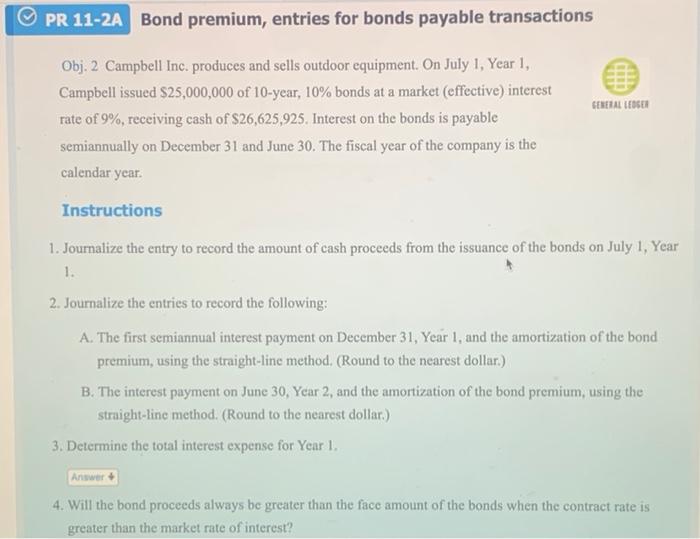
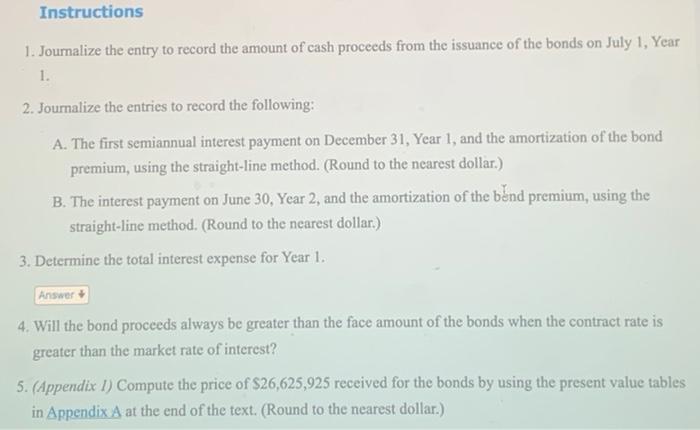
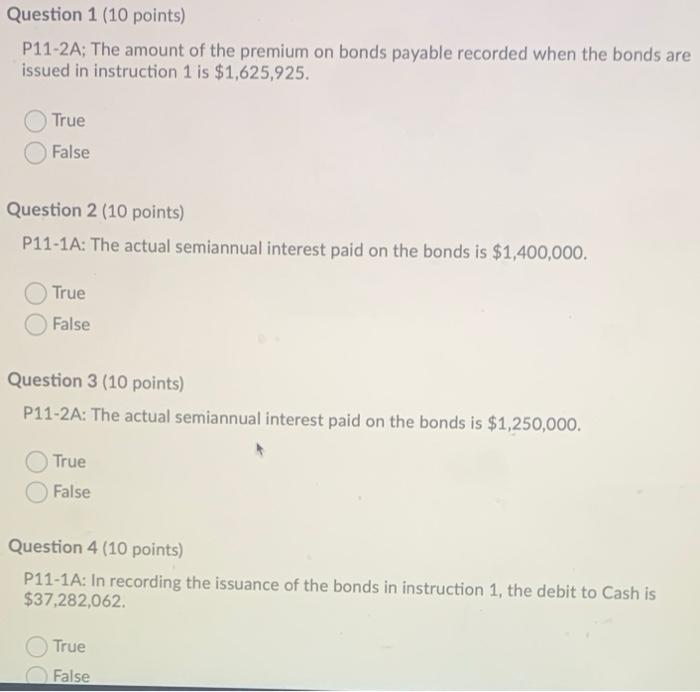
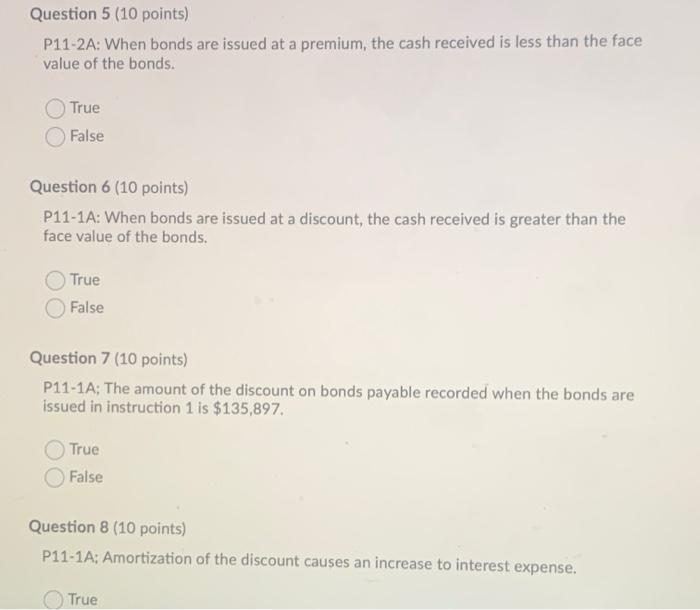
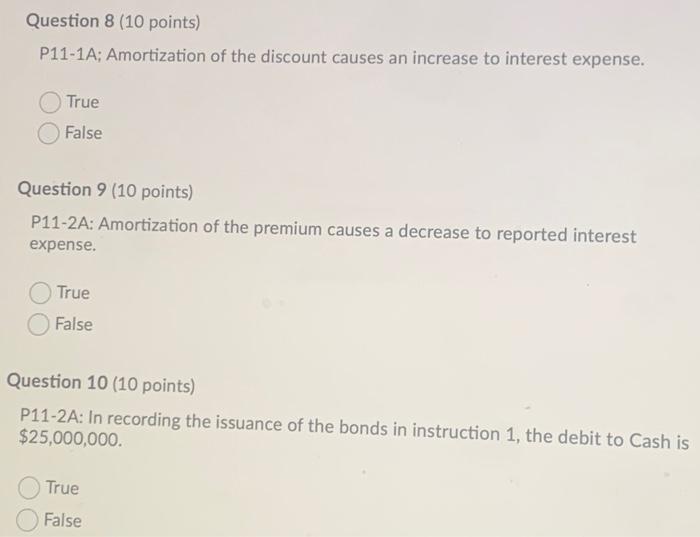
PR 11-1A Bond discount, entries for bonds payable transactions Obj. 2 On July 1, Year 1, Danzer Industries Inc. issued $40,000,000 of 10-year, 7% bonds at a market (effective) interest rate of 8%, receiving cash of $37,282,062. Interest on the bonds is payable semiannually on December 31 and June 30. The fiscal year of the company is the calendar year. SHOW ME HOW Instructions GERERALLEREDO 1. Journalize the entry to record the amount of cash proceeds from the issuance of the bonds on July 1, Year 1. 2. Journalize the entries to record the following: A. The first semiannual interest payment on December 31, Year 1, and the amortization of the bond discount, using the straight-line method. (Round to the nearest dollar.) B. The interest payment on June 30, Year 2, and the amortization of the bond discount, using the straight-line method. (Round to the nearest dollar.) 3. Determine the total interest expense for Year 1. Answer 4. Will the bond proceeds always be less than the face amount of the bonds when the contract rate than the market rate of interest? less SHOW ME HOW Obj. 2 On July 1, Year 1, Danzer Industries Inc, issued $40,000,000 of 10-year, 7% bonds at a market (effective) interest rate of 8%, receiving cash of $37,282,062. Interest on the bonds is payable semiannually on December 31 and June 30. The fiscal year of the company is the calendar year. Instructions GENERAL LEDGER 1. Journalize the entry to record the amount of cash proceeds from the issuance of the bonds on July 1, Year 1. 2. Journalize the entries to record the following: A. The first semiannual interest payment on December 31, Ycar 1, and the amortization of the bond discount, using the straight-line method. (Round to the nearest dollar.) B. The interest payment on June 30, Year 2, and the amortization of the bnd discount, using the straight-line method. (Round to the nearest dollar.) 3. Determine the total interest expense for Year 1. Answer 4. Will the bond proceeds always be less than the face amount of the bonds when the contract rate is less than the market rate of interest? 5. (Appendix 1) Compute the price of $37,282,062 received for the bonds by using the present value tables in Appendix A at the end of the text. (Round to the nearest dollar.) PR 11-2A Bond premium, entries for bonds payable transactions GENERAL LEDER Obj. 2 Campbell Inc. produces and sells outdoor equipment. On July 1, Year 1, Campbell issued $25,000,000 of 10-year, 10% bonds at a market (effective) interest rate of 9%, receiving cash of $26,625,925. Interest on the bonds is payable semiannually on December 31 and June 30. The fiscal year of the company is the calendar year. Instructions 1. Journalize the entry to record the amount of cash proceeds from the issuance of the bonds on July 1, Year 1. 2. Journalize the entries to record the following: A. The first semiannual interest payment on December 31, Year 1, and the amortization of the bond premium, using the straight-line method, (Round to the nearest dollar.) B. The interest payment on June 30, Year 2, and the amortization of the bond premium, using the straight-line method. (Round to the nearest dollar.) 3. Determine the total interest expense for Year 1. | Answer 4. Will the bond proceeds always be greater than the face amount of the bonds when the contract rate is greater than the market rate of interest? Instructions 1. Journalize the entry to record the amount of cash proceeds from the issuance of the bonds on July 1, Year 1. 2. Journalize the entries to record the following: A. The first semiannual interest payment on December 31, Year 1, and the amortization of the bond premium, using the straight-line method. (Round to the nearest dollar.) B. The interest payment on June 30, Year 2, and the amortization of the bend premium, using the straight-line method. (Round to the nearest dollar.) 3. Determine the total interest expense for Year 1. Answer 4. Will the bond proceeds always be greater than the face amount of the bonds when the contract rate is greater than the market rate of interest? 5. (Appendix 1) Compute the price of $26,625,925 received for the bonds by using the present value tables in Appendix A at the end of the text. (Round to the nearest dollar.) Question 1 (10 points) P11-2A; The amount of the premium on bonds payable recorded when the bonds are issued in instruction 1 is $1,625,925. True False Question 2 (10 points) P11-1A: The actual semiannual interest paid on the bonds is $1,400,000. True False Question 3 (10 points) P11-2A: The actual semiannual interest paid on the bonds is $1,250,000. True False Question 4 (10 points) P11-1A: In recording the issuance of the bonds in instruction 1, the debit to Cash is $37,282,062. True False Question 5 (10 points) P11-2A: When bonds are issued at a premium, the cash received is less than the face value of the bonds. True False Question 6 (10 points) P11-1A: When bonds are issued at a discount, the cash received is greater than the face value of the bonds. True False Question 7 (10 points) P11-1A; The amount of the discount on bonds payable recorded when the bonds are issued in instruction 1 is $135,897, True False Question 8 (10 points) P11-1A; Amortization of the discount causes an increase to interest expense. True Question 8 (10 points) P11-1A; Amortization of the discount causes an increase to interest expense. True False Question 9 (10 points) P11-2A: Amortization of the premium causes a decrease to reported interest expense. True False Question 10 (10 points) P11-2A: In recording the issuance of the bonds in instruction 1, the debit to Cash is $25,000,000. True False 






Step by Step Solution
There are 3 Steps involved in it
Step: 1

Get Instant Access to Expert-Tailored Solutions
See step-by-step solutions with expert insights and AI powered tools for academic success
Step: 2

Step: 3

Ace Your Homework with AI
Get the answers you need in no time with our AI-driven, step-by-step assistance
Get Started


